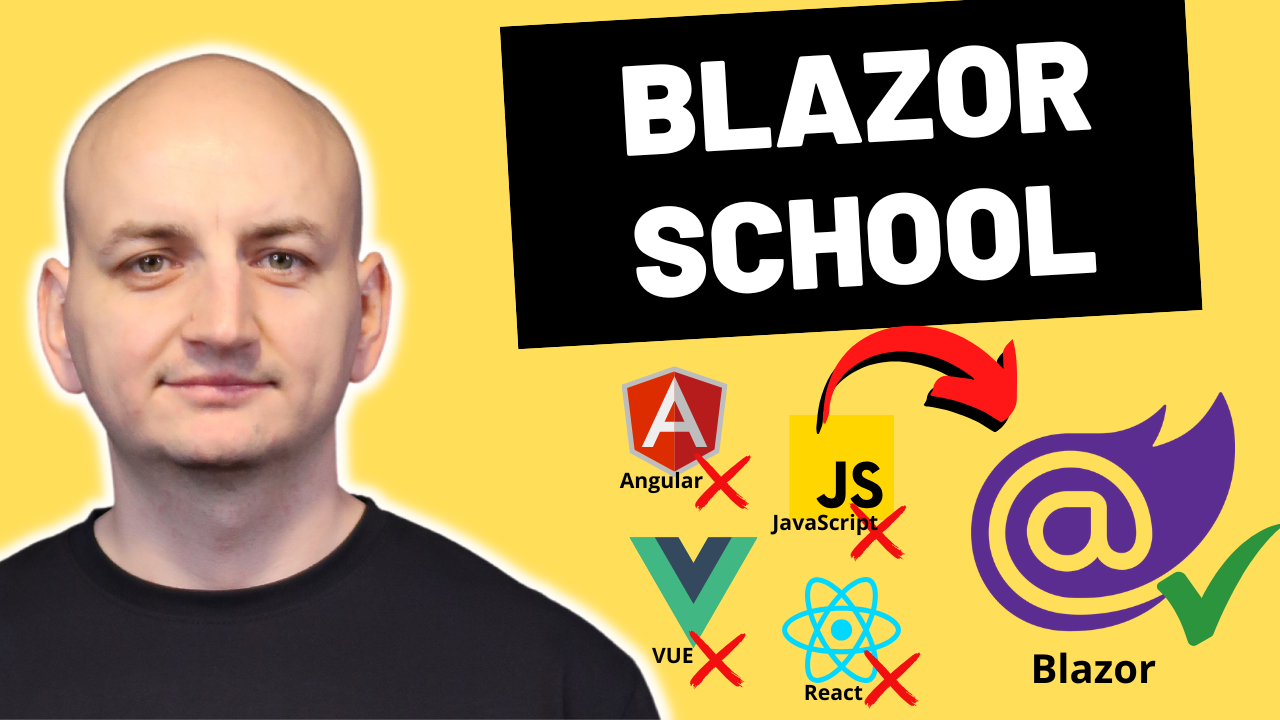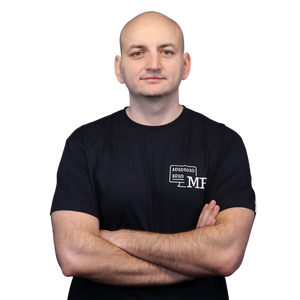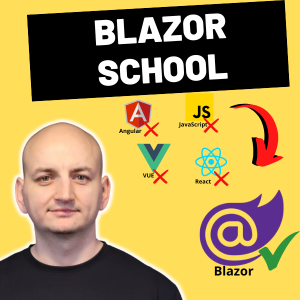I have participated in many job interviews during my career. Some with better results and some with worse results. Make no mistake, not every conversation went perfectly. If you want to become a programmer, you will also miss such conversations. In this article, I wanted to show you more or less what such conversations look like. Of course, such conversations may look different in each company, I am only sharing my experiences here.
Sending your CV
Let's assume that we have already found the right company where we want to work and received an invitation to an interview. It usually looks like this: a few days, sometimes weeks after sending your CV, we receive such a phone call. It happened to me once that I received such a call 6 months after sending my CV, when I had already started working in another company. So, as you can see, various cases happen, if you really want to get into a specific company, I recommend that you call the company a few weeks after sending your CV and ask for details. Sometimes it may happen that your CV gets lost somewhere :)
First impression
Most often, job interviews take place at the company's headquarters. First of all, it would be best not to be late for such a meeting, it is best to be at the company a few minutes early. Alternatively, if you already know that you will be late because, for example, you are stuck in a traffic jam, it is best to call the recruiter and inform him about your situation. Remember this if you don't want to lose your chance of working in this company at the very beginning. The people interviewing you also have a lot of other responsibilities, so don't make them waste time waiting for you. The entire interview usually lasts about 60 minutes. Usually there are several people at the interview, in my case I once talked to 5 people, which wasn't very comfortable, but most often you talk to 2 people, it also happened to me that I only talked to 1 person. One of them is usually a person from HR (Human Resources), who is responsible for the entire recruitment process. Usually, this person guides you through the entire recruitment process and tells you about the company. The second person is usually a technical person, often a programmer, whose task is to check your technical skills and knowledge of technology, depending on the position you are applying for.
Interview
Usually, at the beginning, the HR person describes what such a conversation will look like. He often starts by describing to you what exactly the company does, and here you can expect a few simple questions. You will probably be asked to tell us a few words about yourself. You may also be asked what their company does, just to see if you even know where you're applying. At the same time, they also want to test your soft skills. The job interview is divided into several stages, each of which is often responsible for a different person, which does not mean that only the HR person will talk to you about non-technical topics, and the programmer will talk to you about technical topics. In each case, you will receive questions from all meeting participants.
Non-technical conversation
Testing your soft skills, i.e. non-technical interview. After such an introduction, this is usually the next stage of the conversation. Here, depending on the company, such a conversation can be very relaxed and nice, but it can also be a bit stressful. You usually continue the conversation about the company to which you are applying, you will find out what your job will look like after possible employment, and what the scope of your responsibilities will be. You will also be asked about your current experience. If you have already worked as a programmer, you will definitely be asked why you are changing your job and what you didn't like in your previous job. You will be asked to share your experience. What matters most here is honesty, but you shouldn't talk badly about your previous employer, it may not be well received.
In this first stage, the recruiter wants to get to know you as much as possible, your strengths and weaknesses, but most importantly, he also wants to check how you express yourself. You must remember that a programmer's job is not only about working with code, but also about contact with other people, teammates, implementers, testers, and sometimes customers. Also this stage is also very important, if you are only good at technical topics but do poorly here, you probably won't get the job.
So, continuing the topic of questions, you may be asked about your advantages or disadvantages, interests, where you see yourself in 5 years, what is your greatest achievement, why you want to work in this company. What technologies do you feel comfortable with? In what direction do you want to develop? I also had questions about why I wanted to work as a programmer and what I liked about being a programmer. When you describe your strengths, it is also good to provide some examples of why you think so. It's not enough to say you're hardworking. It would be nice to use an example from your life. For example, you can say that you are hard-working because you work 2 hours every day after working on your application, then it sounds more credible. So, you can expect various questions here, luckily I never received any strange and apparently common questions, e.g. what kind of animal would I like to be and why, or what color describes me best, etc. :)
Also try to ask your questions to recruiters at this stage. Such an interview is not only about checking your personality, but also ask about the company here, because it may turn out that you will pass the recruitment process, but this company will not suit you and after a few days you will want to leave it. Remember to actually be honest here, because recruiters often like to delve deeper into your answers and ask additional questions so that you can tell more about the topic. If you lie here, it will definitely come out. At this stage you may also be asked about your financial requirements.
Technical interview
The next stage in my case was always verification of my technical skills. That is, technology knowledge, which I included in my CV. Usually it is a casual conversation with a programmer, although there are also cases where an HR person also has technical knowledge and can also verify your knowledge here. Also, depending on the position you are applying for, expect questions about this technology - usually they will be simple questions at the beginning, and over time they will become more and more difficult. You may also be presented with a problem here and you will have to present your solution.
If you are applying for a job as a junior .NET developer, be sure to read the document I prepared some time ago. Here you can find the 100 most common technical questions along with the answers I most often received at such meetings. Knowing these questions will certainly greatly increase your chances of getting a cooperation offer. First of all, you need to be prepared for questions related to these technologies that you have included in your CV. Also, if you wrote that you know C++ and C# at an advanced level and you cannot answer questions about the basics, it will not look very good. If you write in your CV that you know a given technology, language or framework, then it should be true. If you wrote a few lines of code in a given language, and it was several years ago and you don't remember any of it, don't brag about your skills because it will be verified.
Testing your technical knowledge
Often the last stage is to test your technical knowledge, but in the form of actually writing code. Many times I was given a test to write on a piece of paper. At least in the companies I applied to, this was a very common practice. You may be asked to write some simple methods to test your ability to write code and solve problems. Here you may also be asked to write a simple application already on your computer. Sometimes it can be an entire small application, and sometimes adding a few lines of code or some new functionalities. It may happen that you will be asked to participate in an orientation day, where you will spend the whole day at the company, thanks to which you will meet your future colleagues and spend a few hours programming. Here too, it may be different in each company, but in some way your skills always need to be verified.
Preparing for a job interview
Every job interview can be stressful, but to minimize the stress as much as possible, I recommend that you simply prepare well for such an interview. There's no denying that initial job interviews can be difficult, but over time, as you gain experience, these interviews will become easier and easier for you. Be prepared for such a conversation. First of all, you need to have technical knowledge, be sure to review the basic issues. Sometimes, during job interviews, questions about the basics are asked, and even seniors might not answer such questions. Because at work they do not focus on theory, but often rely on their experiences. Therefore, before each conversation, repeat the basic issues to yourself so as not to be surprised. Also find as much information as possible about the company to which you sent your CV. You will certainly find a lot of information about it on the Internet. If you don't know something, write it down and ask about it during the interview. Remember that it's not only you who needs to be questioned, but also if you want to learn something about this company, don't be afraid to ask questions.
Before the interview, be sure to read the job advertisement you applied for and your CV again. The information you write in your CV is the most important to the recruiter. During the job interview, the recruiter will have your CV in front of him and will often ask you questions based on it. Besides, it's good if you remember what you wrote there :) Also consider how much you want to earn, because you will definitely be asked about it, and it would be better to have the answer to this question prepared in advance. Also be prepared for financial negotiations, which may take place at the end of the conversation, because unfortunately this is also a common practice and I am not a fan of it.
SUMMARY:
As you can see, the interview process is quite a complicated process. As I mentioned at the beginning, this process is a little different in each company. In this article, I tried to show you what such job interviews most often looked like in my case. Remember that you need to prepare for every conversation. You must have technical knowledge. Focus primarily on the skills you have included in your CV, and also develop soft skills so that they do not determine your possible failure. Your first job interview will definitely be the most difficult, but with each subsequent interview as you gain experience, it will become easier. Also, don't give up if you get a negative response several times. In such situations, try to ask for feedback, draw conclusions and correct what went wrong.
If you have already had any job interviews, please share your experiences in the comments. Good luck with your future job interviews!



